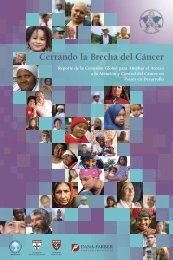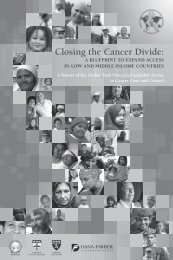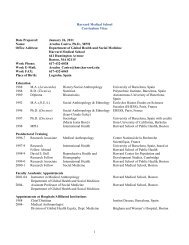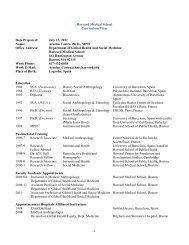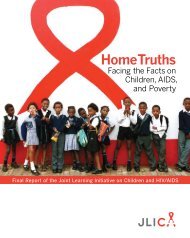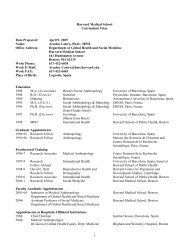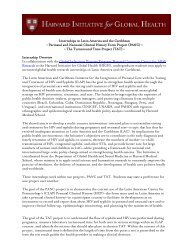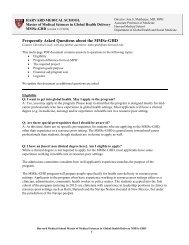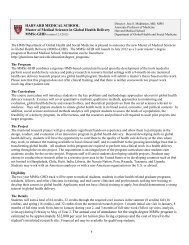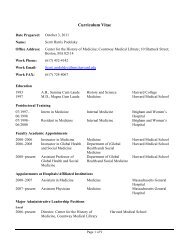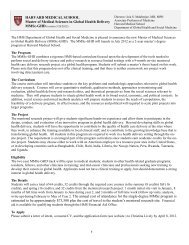Cultural Studies of Biomedicine Research - The Department of ...
Cultural Studies of Biomedicine Research - The Department of ...
Cultural Studies of Biomedicine Research - The Department of ...
Create successful ePaper yourself
Turn your PDF publications into a flip-book with our unique Google optimized e-Paper software.
<strong>Cultural</strong> <strong>Studies</strong> <strong>of</strong> <strong>Biomedicine</strong> <strong>Research</strong><br />
A Sampling <strong>of</strong> Publications<br />
Anne Becker<br />
Special Issue Editor: New Global Perspectives on Eating Disorders, editorial, and “Television,<br />
Disordered Eating, and Young Women in Fiji” in Culture, Medicine and Psychiatry, v.28, 4,<br />
2004.<br />
[From the editorial (excerpts)]: Why devote a special issue <strong>of</strong> CMP to new global perspectives<br />
on eating disorders? First, the public health impact on eating disorders is substantial. <strong>The</strong>se<br />
illnesses – which include anorexia nervosa, bulimia nervosa, and binge eating disorder – affect<br />
over five million Americans (NIMH 1994) and are associated with serious medical and<br />
psychiatric co-morbidity. In fact, the mortality rate associated with anorexia and bulimia nervosa<br />
is one <strong>of</strong> the highest among all psychiatric illnesses. As a result, eating disorders can have a<br />
devastating impact on affected children, adults and their families. Next, contrary to former<br />
prevailing stereotypes that eating disorders selectively burden privileged girls and young women,<br />
these illnesses affect men and women <strong>of</strong> diverse ages and social backgrounds. Risk may be as<br />
high or higher among ethnic minority and socially disadvantaged young women. Finally,<br />
sociocultural factors believed to moderate risk are incompletely understood.<br />
Anne Becker. Ethnicity and Differential Access to Care for Eating Disorder Symptoms.<br />
International Journal <strong>of</strong> Eating Disorders, 2002.<br />
Mary- Jo DelVecchio Good.<br />
“<strong>The</strong> Biotechnical Embrace and the Medical Imaginary.” In Subjectivity: Ethnographic<br />
Investigations. Eds. J. Biehl, B. Good. and A. Kleinman, University <strong>of</strong> California Press, 2007.<br />
[Abstract]: Subjective experiences <strong>of</strong> clinical scientists who produce and deliver high<br />
technology medicine and <strong>of</strong> patients who receive treatment via this technology are fundamental<br />
to understanding the political economy and culture <strong>of</strong> hope that underlie bioscience and<br />
biomedicine. In this essay I examine interpretive concepts linking bioscience and biotechnology<br />
and their societal institutions to subjective experience. <strong>The</strong>se concepts are the medical imaginary,<br />
the biotechnical embrace, the political economy <strong>of</strong> hope, and the clinical narrative. Drawing on<br />
my research and observations <strong>of</strong> the culture and political economy <strong>of</strong> biomedicine in the United<br />
States and internationally, I illustrate from studies <strong>of</strong> clinical scientists, oncologists and their<br />
patients, biotechnology venture capitalists, and public actions and discourses.<br />
“<strong>The</strong> Biotechnical Embrace.” Culture, Medicine and Psychiatry 4, 2001.<br />
[Abstract]: This essay discusses three interpretive concepts that link bioscience and<br />
biotechnology to society: the medical imaginary, the biotechnical embrace, and the clinical<br />
narrative. Drawing on research carried out in the United States and internationally on the culture<br />
and political economy <strong>of</strong> biomedicine, the essay examines these interpretive concepts through<br />
examples from studies <strong>of</strong> patients, clinicians, scientists, and venture capitalists engaged in the<br />
worlds <strong>of</strong> oncology and high-technology medicine. <strong>The</strong>se interpretive concepts contribute to an<br />
understanding <strong>of</strong> how the affective dimensions <strong>of</strong> the experience <strong>of</strong> patients, clinicians and<br />
scientists invested in high-technology medicine are fundamental to bioscience and biomedicine,<br />
and to the political economy and culture <strong>of</strong> hope.
American Medicine: <strong>The</strong> Quest for Competence. University <strong>of</strong> California Press, 1998, 1995.<br />
Mary-Jo DelVecchio Good, Siwi Ratna Padmawati, Amalia Muhaimin, Yati Soenart, Matthew<br />
Lakoma, and Soenarto Sastrowijoto. “Medicine on the Edge <strong>of</strong> Life: Comparative Perspectives<br />
from Academic Medical Centers in Indonesia (Yogyakarta) and America (Boston); “Physicians’<br />
Encounters with the End <strong>of</strong> Life. A Comparative Study <strong>of</strong> Indonesian and American Physicians;”<br />
and “Physician Attitudes about Death and End <strong>of</strong> Life Care: A Comparison <strong>of</strong> Indonesian and<br />
American Academic Physicians.” UGM Center for Bioethics publication, with the support <strong>of</strong> Dr.<br />
Sardjito Teaching Hospital. UGM. Yogyakarta, 2008. (Also in press for international<br />
publications).<br />
Mary-Jo DelVecchio Good, Cara James, Byron Good, and Anne Becker, “<strong>The</strong> Culture <strong>of</strong><br />
Medicine and Racial, Ethnic, and Class Disparities in Health Care,” in Unequal Treatment:<br />
Confronting Racial and Ethnic Disparities in Health Care, ed. Brian D. Smedley, Adrienne Y.<br />
Stith, and Alan R. Nelson. Washington, D.C.: IOM, <strong>The</strong> National Academies Press, pp. 594-625<br />
(2003); Reprinted in revision as “<strong>The</strong> Culture <strong>of</strong> Medicine and Inequalities in Medical Care by<br />
Race, Ethnicity and Social Class” in Social Inequalities, eds. Mary Romero and Edward<br />
Margolis, <strong>The</strong> Blackwell Series in Sociology. 2005.<br />
Guido Giarelli, Mary-Jo DelVecchio Good, Byron J. Good.eds. Clinical Hermeneutics<br />
(Bologna Italy), 2005.<br />
Patricia Ruopp, Mary-Jo DelVecchio Good, Matthew Lakoma, Nina M. Gadmer, Robert M.<br />
Arnold, and Susan D. Block, “Questioning Care at the End <strong>of</strong> the Life: Physicians’ Reflections<br />
on Errors and Mistakes,” Journal <strong>of</strong> Palliative Care 8: 2005.<br />
[Abstract (excerpts)]: Physicians question care more frequently in most emotionally powerful<br />
deaths than recent deaths. Physicians question communication with patients and families and<br />
within medical teams, medical judgment and technique, standards <strong>of</strong> practice, and high-risk<br />
treatments, <strong>of</strong>ten assigning responsibility for medical management they perceive as inappropriate,<br />
futile, overly aggressive, or mistakes in judgment and technique. Responsibility ranges from the<br />
culture <strong>of</strong> medicine to the personal. Frustration, guilt and anger are more frequently expressed in<br />
narratives when care is questioned.<br />
Mary-Jo DelVecchio Good, Nina M. Gadmer, Patricia Ruopp, Matthew Lakoma, Amy M.<br />
Sullivan, Ellen Redinbaugh, Robert M. Arnold, and Susan D. Block , “Narrative Nuances on<br />
Good and Bad Deaths: Internists’ Tales from High-Technology Work Places,” Social Science<br />
and Medicine 58: 2004.<br />
[Abstract (excerpts)]: “Good death” and “bad death” are common in popular discourse on death<br />
and dying. However, these terms are rarely used by physicians in this study. Physicians’<br />
narratives are nuanced with pr<strong>of</strong>essional judgments about what constitutes quality end-<strong>of</strong>-life<br />
care. Three major themes emerge from these narratives and frame the positive and negative<br />
characteristics <strong>of</strong> paitne death. Time and Process, Medical Care and Treatment Decisions, and<br />
Communication and Negotiation. When these physicians’ narratives about patient deaths are<br />
compared with the classic sociological observations made by Glaser and Stauss in A Time for
Dying (1968), historical continuities are evident as are striking differences associated with rapid<br />
innovation in medical technologies and a new language <strong>of</strong> medical futility.<br />
Doris Chang, Mary-Jo DelVecchio Good, Byron Good. eds. <strong>The</strong> Politics <strong>of</strong> Science: Culture,<br />
Race, Ethnicity, and the Supplement to the Surgeon General’s Report on Mental Health. Culture,<br />
Medicine and Psychiatry 27:4 2003.<br />
[Abstract: (Editorial Excerpts)]: <strong>The</strong> essays in this collection address the back story <strong>of</strong> the<br />
making <strong>of</strong> the Supplement to the Surgeon General’s Report on Culture, Race and Ethnicity in<br />
Mental Health Care. <strong>The</strong> Surgeon General’s Report places mental health care at the center <strong>of</strong> the<br />
discussions <strong>of</strong> health care disparities. Such documents add momentum to recent scientific and<br />
policy movements to investigate and redress the fundamental sources <strong>of</strong> disparities and<br />
inequalities in medical treatment and mental health care. <strong>The</strong> essays (in this issue) suggest that<br />
disciplinary perspectives exert a powerful influence on the evaluation and presentation <strong>of</strong><br />
scientific evidence concerning culture in policy research. Should culture be conceived as<br />
independent variables or as categories appropriated and contested by individuals and groups?<br />
How can various forms <strong>of</strong> research contribute to investigating differences in prevalence <strong>of</strong><br />
mental illness and disparities in access to good quality mental health services by race and<br />
ethnicity? Debate over these issues continues in these essays. <strong>The</strong>re is little wonder that<br />
methodological and theoretical issues became the course <strong>of</strong> contention in writing the Supplement.<br />
<strong>The</strong>se essays attest not only to the challenges faced in constructing this document, but to the<br />
enormous achievement <strong>of</strong> the Surgeon General and a large group <strong>of</strong> dedicated scientists and<br />
federal staff.<br />
Michael M.J. Fischer. “Ethnographic Critique and Technoscientific Narratives: <strong>The</strong> Old Mole,<br />
Ethical Plateaux, and the Governance <strong>of</strong> Emergent Biosocial Polities.” Culture, Medicine and<br />
Psychiatry 4; 2001.<br />
[Abstract]: A reading <strong>of</strong> the puzzle novel, Vienna Blood, by Adrian Mathews is juxtaposed to<br />
three ethnographic sketches <strong>of</strong> contemporary ethical plateaus or domains <strong>of</strong> ethical challenge --<br />
the challenges <strong>of</strong> informed public consent to new technologies, the seductions to do whatever is<br />
medically possible (sometimes at the expense <strong>of</strong> quality <strong>of</strong> life or the 'good death'), and the<br />
power <strong>of</strong> money in driving the biotechnological industries. Vienna Blood deals with<br />
precautionary germplasm modification and chemical camouflage justified as protection against<br />
ethnically-targeted biological warfare, and touches on a series <strong>of</strong> technologies such as new<br />
reproductive technologies, genetic engineering, and cryptographic attacks and defenses, as well<br />
as the ability to evade regulatory controls. Such technoscientifically informed novels are useful<br />
as cautionary tales, in exploring the complexity and interaction among new technologies, and the<br />
phantasmagoria that help drive new technologies. <strong>The</strong>y are not so good at thinking through<br />
institutional development: a challenge for ethnography and new social theory. Ethnography, like<br />
novels, can function as checks on the mechanisms <strong>of</strong> abstraction and universalization that<br />
frequently bedevil the non-anthropological, non-cross-culturally or cross-temporally comparative,<br />
social sciences. Questions are raised about new or emergent biosocialities, forms <strong>of</strong> governance,<br />
and forms <strong>of</strong> cultural critique.<br />
Giuseppe Raviola, M'Imunya Machoki, Esther Mwaikambo and Mary-Jo DelVecchio Good.<br />
“HIV, Disease Plague, Demoralization and ‘Burnout’: Resident Experience <strong>of</strong> the Medical<br />
Pr<strong>of</strong>ession in Nairobi, Kenya.” Culture, Medicine and Psychiatry, March 2002.
Mary-Jo DelVecchio Good with Esther Mwaikambo, Erastus Amayo, and James M'Imunya<br />
Machoki. “Clinical Realities and Moral Dilemmas: Contrasting Perspectives from Academic<br />
Medicine in Kenya, Tanzania, and America.” Daedalus 128(4):167-196; 1999.<br />
Mary-Jo DelVecchio Good and Byron J. Good. “Clinical Narratives and the Study <strong>of</strong><br />
Contemporary Doctor-Patient Relationships.” In Gary L. Albrecht, Ray Fitzpatrick and Susan C.<br />
Scrimshaw, eds., <strong>The</strong> Handbook <strong>of</strong> Social <strong>Studies</strong> in Health and Medicine. London: Sage<br />
Publications Ltd., 2000.<br />
Mary-Jo DelVecchio Good and Byron J. Good. “‘Parallel Sisters’: Medical Anthropology and<br />
Medical Sociology.” In Chloe Bird, Peter Conrad, and Allen Fremont, eds., <strong>The</strong> Handbook <strong>of</strong><br />
Medical Sociology, pp. 377-388. Upper Saddle River, NJ: Prentice Hall, 2000.<br />
Byron J. Good and Mary-Jo DelVecchio Good. “'Fiction' and 'Historicity' in Doctors' Stories:<br />
Social and Narrative Dimensions <strong>of</strong> Learning Medicine.” In Cheryl Mattingly and Linda Garro,<br />
eds., Narrative and the <strong>Cultural</strong> Construction <strong>of</strong> Illness and Healing. Berkeley: University <strong>of</strong><br />
California Press, 2000.



